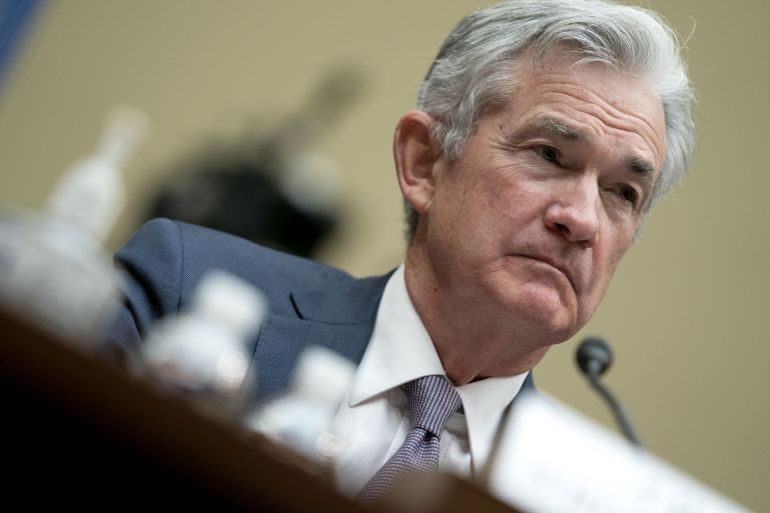Powell: Economy will not be confident until world is vaccinated
The chairman of the United States Federal Reserve expressed concern about an ‘uneven’ US and global recovery during an International Monetary Fund debate on Thursday.

Viruses do not respect borders, and until the world is fully vaccinated against the coronavirus, the global and United States economies will not be able to resume activity with confidence, Jerome Powell, the chairman of the US Federal Reserve, warned on Thursday.
“We got a taste of what faster progress will look like,” Powell said at an International Monetary Fund (IMF) debate on the global economic recovery.
Keep reading
list of 4 itemsWorld Bank, IMF consider linking debt relief to climate efforts
Pros, cons and pragmatism: Biden’s plan to fund infrastructure
What are SDRs and why are they a hot topic at the IMF meeting?
“The recovery, though here, remains uneven and incomplete. The burden is still falling on lower-income workers and the unemployment rate in the bottom quartile is still 20 percent,” he added, referring to unemployment statistics in the US.
Joining Powell were IMF’s Managing Director Kristalina Georgieva, World Trade Organization (WTO) Director-General Ngozi Okonjo-Iweala and the Republic of Ireland’s Finance Minister Paschal Donohoe.
The IMF and World Bank have been holding their annual spring meetings this week, with 2021’s discussions focused on the global rebound from the coronavirus pandemic and the challenges facing the world’s most vulnerable countries and communities.
The fallout from the coronavirus could have been three times worse for the global economy, the IMF said this week, if countries hadn’t stepped in to provide support.
On Thursday, Georgieva reiterated her praise for central banks after they passed $16 trillion dollars in fiscal support. But she emphasised the fight isn’t over yet.
“Premature withdrawal of support can cut the recovery short,” Georgieva warned.
On Tuesday, the IMF upgraded its global growth projection to six percent – a lift primarily driven by strong rebounds in the US, China and several emerging markets.
But although Powell commended mass vaccination campaign efforts and recoveries in unemployment, the US central bank chief warned that the US recovery remains lopsided and unequal.
Premature withdrawal of support can cut the recovery short.
Eight and a half million Americans still remain out of work. Most of the pain has been felt by workers in the service industry, much of which was shuttered for much of 2020.
People who lost jobs were relatively low-paid service workers in hotels and restaurants. And many of them are minorities and women with limited funds to fall back on, Powell said.
Such disparities and inequalities are widening within and across countries.
“It is low-skilled workers, women, and, unfortunately, young people – who entered the labour market at a time the economy was in a recession – they are more severely hit,” Georgieva said.

As economies open back up, job opportunities are expected in sectors like renewable energy, reforestation and land preservation. In the US, President Joe Biden recently announced his new $2.25 trillion infrastructure plan, which he promised will create well-paying jobs.
And while rich countries have the capital to invest in revamping and rebuilding sectors of their economies, low-income countries and tourism-dependent small islands are severely constrained, the IMF chief said.
On Thursday, world finance chiefs agreed to boost the IMF’s special drawing rights (SDRs) by a $650bn allocation to help countries stay afloat as the global economy gets back up and running.
WTO chief Okonjo-Iweala expressed alarm Thursday that poor nations are falling behind.
“So far 0.1 percent of vaccines have gone to low-income countries; about 86 percent to high- and upper-middle-income countries,” she said.
Donohoe, Ireland’s finance minister, touched on vaccine distribution in Europe, noting that the European Union plans to have 70 percent of its adult population vaccinated by the summer.
Europe has run into some challenges in its vaccination efforts “due to the fact that the European Union has so many different countries within us”, he said.
“We do have a number of difficulties that we need to work our way through, but we are working through them,” Donohoe added.